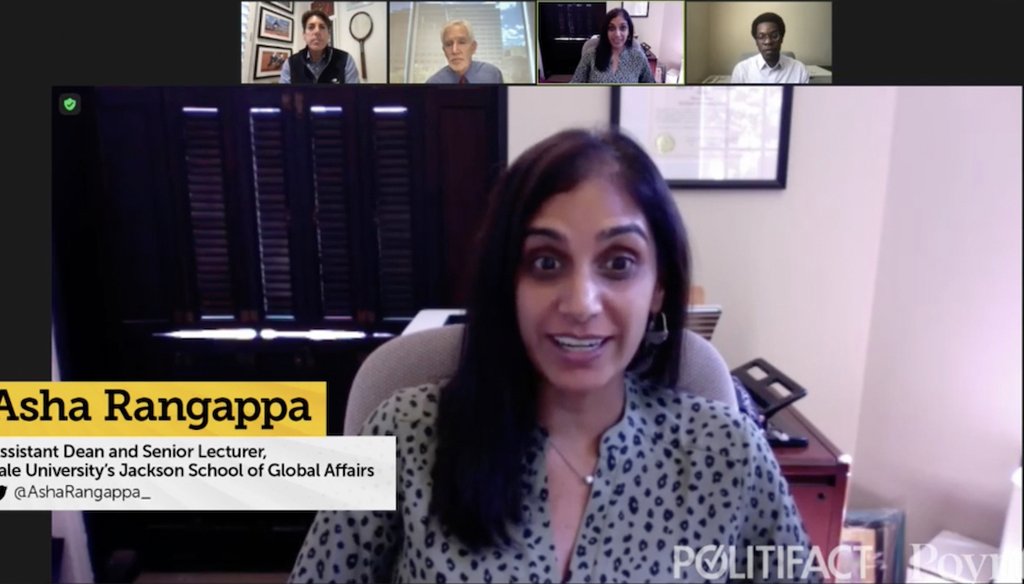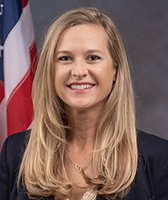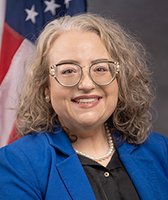Stand up for the facts!
Our only agenda is to publish the truth so you can be an informed participant in democracy.
We need your help.
I would like to contribute

Former FBI special agent and legal and national security analyst for CNN Asha Rangappa discusses “The Truth of Trump” Sept. 27, 2022, at PolitiFact’s United Facts of America conference. PolitiFact Senior Correspondent Jon Greenberg moderated.
The 2020 presidential election result is clear: Donald Trump lost. But fighting his stolen election narrative is a problem that requires a multipronged solution, three experts said Sept. 27 at United Facts of America: A Festival of Fact-Checking.
The three-day conference, presented by PolitiFact and the Poynter Institute for Media Studies, began Sept. 27 and continues through Sept. 29.
Washington Post White House Bureau Chief Toluse Olorunnipa, Gray Television White House Correspondent and Senior National Editor Jon Decker, and former FBI special agent and legal and national security analyst for CNN Asha Rangappa discussed "The Truth of Trump" in a round-table discussion with PolitiFact Senior Correspondent Jon Greenberg.
The former president is the subject of multiple investigations, including federal probes into his attempt to overturn his 2020 election loss, his ties to the Jan. 6, 2021, attack on the U.S. Capitol by his supporters and his potential mishandling of classified information after the FBI's August search of his Mar-a-Lago estate in Florida.
However, even amid legal peril, Trump has managed to manipulate the framing of these major events, experts said, and facts alone won't sway his supporters or bridge a widening partisan divide.
"When you have a strong group identity, you're motivated not by accuracy, but really by signaling your belonging in the group," Rangappa said.
The House select committee investigating the Jan. 6, 2021, attack on the U.S. Capitol has presented "explosive" information about Trump's role in inciting the violence that took place.
But whether it has shifted public opinion remains to be seen, the panelists said.
"It has definitely illuminated public opinion about what happened," Olorunnipa said. "When it comes to sort of the partisanship that has surrounded this issue for quite a while, people are still very much in their camp."
The scope of the committee's work is massive, Olorunnipa said. "They have tried to make these hearings full of new information so that they can get the attention of the American public."
However, social media may still have an edge in shaping the public's view of the former president's push to overturn the 2020 election result.
"Social media certainly amplifies the message in an instantaneous way," Jon Decker of Gray TV said. "You don't necessarily have to be in front of your television screen to get a false message sent to your phone."
Supporters of the former president tend to seek out narratives that support their existing viewpoints, whether the information in those narratives is true or not, Decker said.
The panelists also said that conservative media and social media often feed off one another, and most people equate repetition to credibility.
"If Fox News is the cigarette, social media is the secondhand smoke," Rangappa said. "It's just wafting everywhere, and people who may not have even chosen to be consumers of the original product are being confronted with it."
The pace of verifying and publishing information typically lags behind the virality of misinformation, the experts noted. To create a lasting impact, the media must rethink how to get reliable facts to the public.
"There's a lot of misinformation out there, and there are only so many journalists," Olorunnipa said. "It's much harder to do that and verify and publish reliable information than it is to just cut out rumors and conspiracy theories."
Misinformation peddled by people in power, like Trump, can make clearing the disinformational fog complicated.
"When you have people in power who see the power that they can amass through misinformation, through misleading the public, through casting aspersions on fair and accurate news," Olorunnipa said, "it makes our job harder."
The first person who gets the narrative out also has a major advantage. So, news media must anticipate the misinformation that may surround a political event and "prebunk" it, that is, debunk it in advance.
"Once a narrative has taken root, fact-checking is not going to get people to change their mind," Rangappa said. "You definitely want the facts out there, but the corrective information isn't going to necessarily cure the problem."
The speakers encouraged journalists to break away from norms like "neutrality," which they said bad actors have exploited to push disinformation.
"It took a long time," Rangappa said. "(But) many outlets were finally able to say Trump lied, you know, as opposed to using all of these euphemisms."
RELATED: How partisan television media fuels persistent echo chambers
Our Sources
Listed in the story.














































